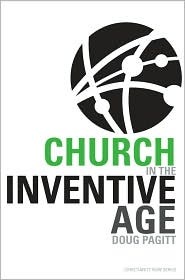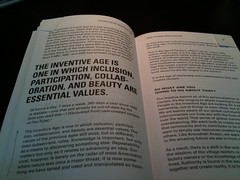Primary Audience – Our local evangelical congregation
Secondary Audience – Evangelicals everywhere
As you probably know, Sunday was the first day of Advent. As I joked in a post last year, Advent is not a new thing. If you are among those who see it as a “trendy thing the kids are doing”, among your New Year’s Resolutions should be to stop underestimating X’ers and Millennials ;-). Many younger evangelicals are trying to connect back to the ancient church and observing the church calendar is among the many practices that many evangelicals were not raised with. I am grateful that our church dedicates a portion of each service to light the candle(s) of the Advent Wreath but I fear that some worshippers may not see its significance and even worse, see it as something novel or cute.
 Advent means “arrival” or “coming” as my friend Evan explains in his Advent Booklet (you should download it because it gives an excellent and easy overview) and it invites the Christian community “to enter into the story of Jesus Christ. During this season one meditates on the coming birth of the Christ but also on His future Second Coming …”. For those who have been raised observing the liturgical calendar, you have come to realize that everyone observes it a little differently. Further, as you click around and do your own research, you will see a lot of disparity regarding practices, meanings, interpretations, etc. As a fan of plurality, this makes this observance less legalistic and also exciting for me.
Advent means “arrival” or “coming” as my friend Evan explains in his Advent Booklet (you should download it because it gives an excellent and easy overview) and it invites the Christian community “to enter into the story of Jesus Christ. During this season one meditates on the coming birth of the Christ but also on His future Second Coming …”. For those who have been raised observing the liturgical calendar, you have come to realize that everyone observes it a little differently. Further, as you click around and do your own research, you will see a lot of disparity regarding practices, meanings, interpretations, etc. As a fan of plurality, this makes this observance less legalistic and also exciting for me.
They key piece for why Advent became so necessary was celebrating it allowed me to reclaim the beauty and wonder of Christmas. I remember one Christmas in particular after aimless gift-buying, an underwhelming cantata/musical/singing Christmas tree and nearly overdosing on Christmas music, the first time I paused to meditate on the holiday’s significance was Christmas Eve night. There were feelings of unpreparedness and “missing out” stung my soul. Preparing my heart before Christmas was key and I became so thankful for the historical church’s practice.
Here are some links for you to check out but I’d like to encourage you to commit to observing this beautiful season of expectation of our Savior’s birth.
Everyday Liturgy, Thomas Turner has some excellent links and introductions for the longtime observer and for the newbie.
Evan Curry’s Advent Booklet
Jr Briggs (a church planter in Doylestown) is posting daily advent readings for his congregation on his blog.
The mobile Bible App YouVersion has an advent reading plan as well.
 network for Christians, concerned citizens, churches and ministries around the world. Collyde is a non-profit organization that is committed to channeling 100% of net profits directly to fight social and economic causes around the world”.
network for Christians, concerned citizens, churches and ministries around the world. Collyde is a non-profit organization that is committed to channeling 100% of net profits directly to fight social and economic causes around the world”. As mentioned, I enjoyed the panel discussion with
As mentioned, I enjoyed the panel discussion with  “In the last 200 years, American culture has moved through three distinct ages – the Agrarian Age, the Industrial Age, and the Information Age – and is heavily engaged in a fourth – an era I have dubbed the Inventive Age. With each of these ages has come a shift in what we think, what we value, what we do, and how we do it” (p 4).
“In the last 200 years, American culture has moved through three distinct ages – the Agrarian Age, the Industrial Age, and the Information Age – and is heavily engaged in a fourth – an era I have dubbed the Inventive Age. With each of these ages has come a shift in what we think, what we value, what we do, and how we do it” (p 4). It’s true that I am biased towards appreciating Doug’s work (everyone is biased towards something you know). As one who spends a lot of time working on the problem of why our churches are shrinking, Pagitt is among the few that have insights and answers worth pursuing. Perhaps one of my greatest admirations of him is that he is truly not afraid to question. I think I can only say that about a handful of people. That said, this does not mean that every question he asks is a good one, but many of them are. So when Doug asks, What should the Church look like in the future, I’m interested in that conversation.
It’s true that I am biased towards appreciating Doug’s work (everyone is biased towards something you know). As one who spends a lot of time working on the problem of why our churches are shrinking, Pagitt is among the few that have insights and answers worth pursuing. Perhaps one of my greatest admirations of him is that he is truly not afraid to question. I think I can only say that about a handful of people. That said, this does not mean that every question he asks is a good one, but many of them are. So when Doug asks, What should the Church look like in the future, I’m interested in that conversation. By the way,
By the way, 




Recent Comments